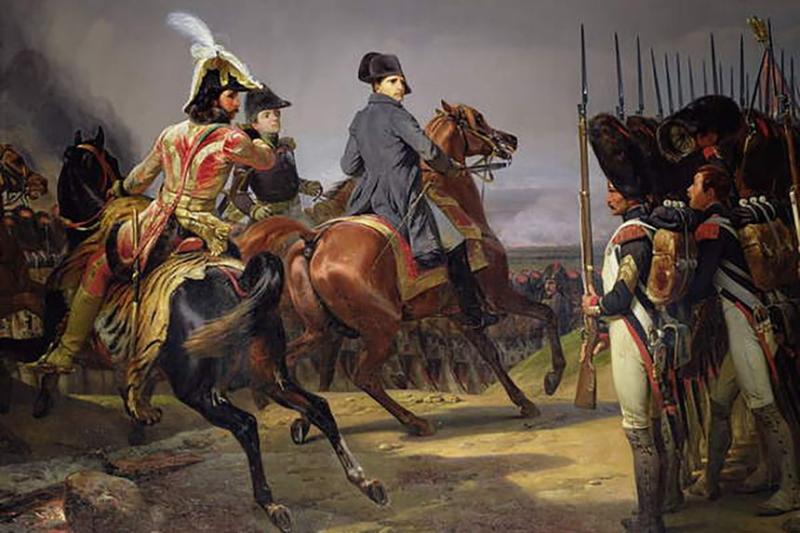'Jena 1800' Review: In Germany, a New Dawn of Idealism
By: Jeffrey Collins (WSJ)



The epochal Battle of Jena was fought on Oct. 14, 1806. A massive French army under Napoleon cut off Prussian and Saxon troops from access to the Elbe River and from possible Russian reinforcements. The French demolished the Germans and within six weeks had conquered all of Prussia. The subsequent Treaty of Tilsit made allies of France and Russia, pitilessly reduced Prussia and Austria, and planted French client states throughout central Europe. The 1,000-year-old Holy Roman Empire, dominated for centuries by the Austrian Habsburgs, came to its end. Everywhere Bonaparte was acknowledged as the "new Charlemagne."
A notable witness to these events was the philosopher Georg Wilhelm Friedrich Hegel, then living in the town of Jena. Incredibly, Hegel had completed his masterwork, "The Phenomenology of Spirit," on the eve of the battle. In "Jena 1800: The Republic of Free Spirits," Peter Neumann recounts the scene. After Hegel's apartment had been ransacked by French soldiers, he fled in his slippers, clutching the final pages of his manuscript. In the streets he encountered Napoleon: "I saw the Emperor—this world-soul—riding out of the city on reconnaissance. It is indeed a wonderful sensation to see such an individual, who, concentrated here at a single point, astride a horse, reaches out over the world and masters it."
Napoleon would become the model of Hegel’s “world-historic individual”: outstanding figures whose triumphs advance the Geist, Spirit or Ideal of their era, bringing humanity ever greater consciousness of its own freedom. Germans with a less Olympian theory of history rarely shared Hegel’s admiration for their conqueror. Nevertheless, the fleeting encounter of the emperor and the philosopher was the stuff of providence—as if the arc of history had intersected with the designs of history’s philosopher-architect.
Briefly the site of battle, Jena was otherwise known as the home of Germany’s most prominent university. At the turn of the 19th century, in this modest town under the shadow of war, were born two remarkable intellectual movements: German Idealism and German Romanticism. It is the aim of “Jena 1800” to fix these movements in time and place, observing them as they emerged in the entwined lives of their leading figures. A group biography, the book offers scenes and episodes illustrative of a period of extraordinary intellectual ferment. Alongside ideas, it narrates war, romance, university politics, professional rivalries and domestic tragedies.
The book is novelistic and eccentric. Translated from the German by Shelley Frisch, it assumes more background knowledge than anglophone readers will generally possess and is too brief and sporadic to offer a comprehensive intellectual history. Nevertheless, it succeeds at conveying the personalities, the atmosphere, and the exhilaration of Jena’s philosophical and aesthetic revolution.
German Idealism and Romanticism emerged under two shadows: that of Napoleon, the awesome victor of revolutionary France who, to many progressive Germans, betrayed the revolution’s emancipatory promise; and that of Immanuel Kant, the pre-eminent German philosopher who brought the Enlightenment to its culmination but also revealed its limits.
In 1804 (the year of Napoleon’s imperial coronation), Kant died in the Prussian city of Königsberg. By then he was decrepit and secluded, but his major works had already reset European philosophical life. Seeking to transcend the conflict between rationalism and empiricism, Kant posited that the world of things—while it certainly existed—couldn’t be known to us directly. “Things in themselves” existed for humans only through the prism of a priori categories of perception, notably space and time. Against skepticism Kant vindicated reason but narrowed its scope. Reason couldn’t access metaphysical truths; nor could the scientific method disclose the secrets of nature empirically. Kant’s “transcendental idealism” restricted our theoretical (or “transcendent”) knowledge; it allowed us to systematize the appearance of things but not to apprehend their inner reality.
“The new critical thinking,” writes Mr. Neumann, referring to Kant’s transcendental Idealism, “seized the European continent like a shockwave.” To the religiously orthodox, Kantianism destroyed our knowledge of God. To the “Enlightened,” it diminished the glories of the scientific method. “There were no longer oases of eternal truths,” concludes Mr. Neumann. This new world was to some terrifying and to others liberating.
Jena hosted a series of philosophers who promoted, and radicalized, the achievements of the master. These figures presided over Mr. Neumann’s “republic of free spirits.” The most famous were Johann Gottlieb Fichte, Friedrich Wilhelm Joseph Schelling, and Hegel, all of whom would blaze through Jena as philosophical superstars. Fichte’s version of Idealism dispensed entirely with “things in themselves.” His things were mind-dependent, existing only in our consciousness. The result was a kind of radical subjectivism. Writes Mr. Neumann: “Man has no authority above himself, Fichte insisted, and must adhere only to laws that he, as a rational being, has enacted for himself.”
Schelling would pursue Idealism down a different path, rejecting the privileging of the mind over things. He exalted the “world as a totality,” in which mind and nature were different aspects of the same “Absolute.” “Nature,” writes Mr. Neumann of Schelling’s system, “functioned as a medium for the mind to recognize itself and take shape.”
Schelling’s Idealism was more naturalistic and intuitive than Fichte’s icy abstractions, and it fed into the parallel movement of Romanticism, as Mr. Neumann shows. Goethe considered Schelling a “poet of the thinkers,” whose ideas paralleled his own understanding of mind and nature as a totality. The Jena Romantics included the poet and philosopher Friedrich Schlegel; his brother Wilhelm, the leading German translator of Shakespeare; the novelist Dorothea Schlegel (married to Friedrich); the writer Caroline Schlegel (married to Wilhelm and later to Schelling); the poet Ludwig Tieck; and the mystic writer Georg Philipp Friedrich Freiherr von Hardenberg (who wrote under the name “Novalis”). The brothers Schlegel and their wives set up house in Jena, and this became the salon-headquarters of the Jena Romantics.
Plays, novels and poems followed, and criticism in the organ Athenaeum, edited by the Schlegel brothers. The hallmarks of German Romanticism were a critical deference to “artistic genius” and a desire to harmonize art, science and philosophy into an integrated whole. Unusually, they appreciated the Middle Ages as an era of organic culture and socially embedded art. This medieval or Gothic aesthetic could make the Romantics, in turn, hostile to the airless rationalism and classicism of the Enlightenment. “The political revolution in Paris may have failed,” writes Mr. Neumann, “but here, a different one—an aesthetic revolution—was drawing near.” Central was a less formal and more naturalistic account of the imagination. Abstract concepts were blind to feeling, but imagination flickered “between concept and perception, rationality and sensuality, mind and nature, idea and experience.” Art could, in this sense, bridge the Kantian chasm between subject and object.
The creations of the Romantics included Friedrich Schlegel’s experimental novel “Lucinde,” in which erotic love letters, fictional diary entries, aphorisms and critical reflections appeared with almost Joycean abandon. More accessible and equally emblematic of the emerging Romantic style were the poems composed by Novalis before his premature death at the age of 28, “Hymns to the Night”: “Oh draw at my heart, love / Draw till I’m gone, / That, fallen asleep, I / Still may love on. / I feel the flow of / Death’s youth-giving flood / To balsam and ether / Transform my blood— / I live all the daytime / In faith and in might / And in holy fire / I die every night.”
The success of “Jena 1800” relies on its kaleidoscopic narrative style. The doctrines of the Idealists and the effusions of the Romantics are not neatly summarized as if in retrospect. Instead they spill out in real time, amid the personal triumphs and tragedies of their authors. We travel with them to view, by torchlight, antiquity collections in Dresden. We attend their Christmas parties at the Schlegel house, watching them read poetry to one another by the fire. We learn of their writing habits, their tastes in food, their money worries, their romantic interests (notably between Caroline Schlegel and her eventual second husband Schelling, under the nose of her first husband).
The intellectual drama of the book plays out less in major philosophical and literary works and more in now-obscure essays and reviews (which enraged conservative opinion in Berlin) and even more in the university lectures offered by the men of the Jena cohort. These lectures were must-attend events, packed by students expecting to be dazzled by the oracular insights of professorial sages.
Equally captivating are the lives of Dorothea and Caroline Schlegel. Formidable intellects and writers, they served as the social center of Jena’s literary “republic.” Publicly derided for their politics and unconventional lifestyles, they weren’t afforded the deference enjoyed by their husbands. They emerge, nevertheless, as the book’s most indominable characters.
Mr. Neumann has provided an evocative account of a rich episode in Europe’s cultural history. How relevant readers will find his subjects is another question. To be sure, Romanticism since its inception has never fully lost its grip on modern artistic taste. The Romantic aesthetic—emotive, sensory, heroically subjective—endures.
Idealism, by contrast, has less of a hold. Our current philosophical mood is naively materialistic and deterministic, dazzled by the supposed capacity of natural science to reveal all truth. This perspective better recalls late-19th-century positivism or the more dogmatic materialists of the Enlightenment.
Even less appealing today will be the social and political thought of the Jena cohort. Kant insisted on the intrinsic value of autonomous individuals, and his ethics have been readily accommodated by modern liberalism. But both Fichte and Hegel viewed abstract individual rights as insufficient. Ethical freedom was achieved in interactive community, custom and tradition, nation and state. In the ashes of his country’s Napoleonic humiliations, Fichte promoted German language, culture and nationhood as the pillars of a spiritual empire. For Hegel, the logic of history was collective, and individuals could only realize true freedom in allegiance to a state.
Prominent later commentators, including Karl Popper and Isaiah Berlin, scorned the Idealists’ communalism as inherently nationalistic and even totalitarian, preparing Germany for its militaristic, authoritarian future. These critiques are highly exaggerated, and certainly Mr. Neumann has no time for them. His book is much warmer toward the Jena free spirits, whom he presents as progressive visionaries. One suspects, however, that they would have found our late liberal world naively empirical in philosophy and unattractively solipsistic in culture. “Jena 1800” is, in this respect, the devoted account of a lost cause.
—Mr. Collins is a professor of history at Queen’s University in Kingston, Ontario.

Who is online
48 visitors

